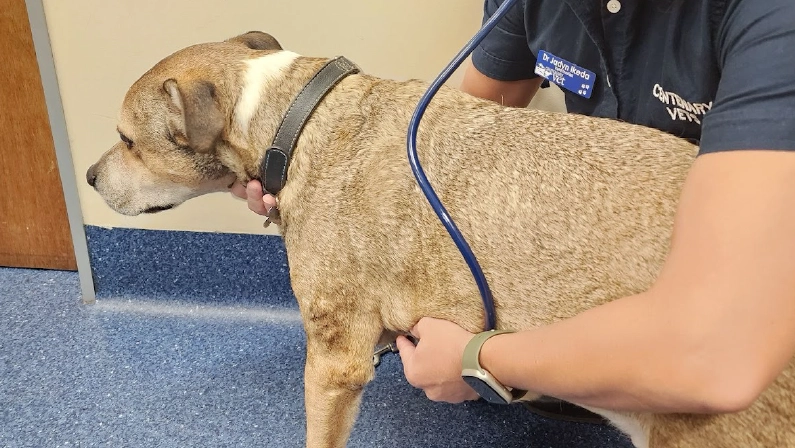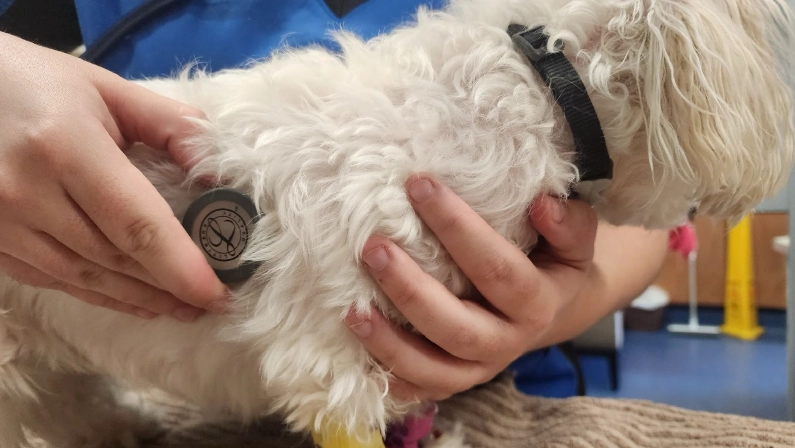As devoted pet parents, we do everything in our power to ensure our furry companions live long, happy, and healthy lives. But one serious health concern that often goes unnoticed until it’s too late is heart disease.
Just like in humans, pets can develop heart conditions that, if left undetected, can significantly impact their quality of life. The good news? With early detection by your trusted veterinary cardiologist and proper management, many pets with heart disease can continue to live happy, healthy lives.
What Is Heart Disease in Pets?
Heart disease in pets refers to a variety of conditions that affect the heart’s ability to function properly. These conditions can be either congenital (present at birth) or acquired (developing over time). While some heart diseases can be managed effectively, others may progress to congestive heart failure if not addressed.
According to a study published heart disease affects approximately 15% of cats and 1 out of 10 dogs have heart diseases, with variations depending on breed, age, and genetic predisposition. The prevalence increases significantly in senior pets, making regular check-ups essential.
Common Types of Heart Disease in Pets
Congenital Heart Disease
Some pets are born with heart abnormalities due to genetic factors. These conditions may require lifelong management or, in some cases, surgical intervention. Some common congenital heart diseases include:
- Hypertrophic Cardiomyopathy (HCM): The most common heart disease in cats, HCM causes the walls of the heart’s left ventricle to thicken, making it harder for the heart to pump blood effectively.
This condition can lead to sudden difficulty breathing, weakness, or even collapse. Studies indicate that up to 30% of domestic cats may have some form of HCM, especially in breeds like Maine Coons and Ragdolls.
- Patent Ductus Arteriosus (PDA): A condition where a fetal blood vessel fails to close after birth, leading to heart enlargement and potential heart failure if left untreated. Surgical correction has a high success rate of 90-95% when detected early.
- Pulmonic or Aortic Stenosis: A narrowing of the heart’s valves or vessels, which makes the heart work harder to pump blood. Over time, this extra effort can lead to heart muscle fatigue and decreased oxygenation.
Acquired Heart Disease
Many pets develop heart disease later in life, often due to aging, infections, or other underlying health conditions. Common acquired heart diseases include:
- Degenerative Valve Disease (DVD): Particularly common in older, small-breed dogs, this condition causes the heart valves to thicken, leading to inefficient blood flow and, eventually, congestive heart failure. Studies show that DVD accounts for 75% of all canine heart disease cases and is particularly prevalent in breeds such as Cavalier King Charles Spaniels.
- Dilated Cardiomyopathy (DCM): A condition where the heart muscle weakens and stretches, reducing its ability to pump blood efficiently. DCM is more common in large-breed dogs such as Doberman Pinschers and Great Danes. Research has linked certain grain-free diets to an increased risk of DCM in dogs.
- Heartworm Disease: A serious, potentially fatal condition caused by parasitic worms that invade the heart and lungs. Preventative measures such as monthly heartworm prevention treatments are crucial in keeping pets safe.
Recognising the Signs of Heart Disease in Pets
Heart disease can be tricky to detect in its early stages, as pets are masters at masking symptoms. However, some warning signs indicate potential heart issues, including:
Persistent Coughing
A lingering or chronic cough, especially one that worsens at night or after physical activity, can be an early sign of heart disease. This occurs because fluid accumulation in the lungs, known as pulmonary edema, can result from congestive heart failure.
Additionally, an enlarged heart can put pressure on the trachea (windpipe), leading to irritation and coughing. If your pet has been coughing for more than a few days, particularly without signs of infection like a runny nose or fever, it’s essential to consult a veterinarian.
Difficulty Breathing
Labored breathing or an increased breathing rate, even while at rest, can signal a serious heart condition. If your pet breathes heavily, pants excessively without exertion, or has a rapid respiratory rate (more than 30 breaths per minute while sleeping), this could indicate fluid buildup around the lungs due to poor heart function.
Some pets with heart disease will also exhibit open-mouth breathing or appear to be gasping for air, which requires immediate medical attention.
Lethargy and Exercise Intolerance
If your once-playful pet suddenly lacks enthusiasm for physical activities like running, walking, or playing, it could be due to reduced circulation and oxygen delivery from an impaired heart. Pets with heart disease often appear tired, weak, or reluctant to move for long periods.
Some may refuse to go up stairs, struggle with short walks, or need frequent breaks. These signs may develop slowly, so owners should monitor changes in their pet’s usual energy levels over time.
Fainting or Collapse
Syncope, or fainting, occurs when there is a temporary lack of blood flow to the brain due to the heart’s inability to pump effectively. Pets experiencing fainting episodes may suddenly lose balance, fall over, or momentarily lose consciousness.
This can be triggered by excitement, exercise, or prolonged standing. Unlike seizures, which often involve twitching and uncontrolled movements, fainting episodes from heart disease are typically brief and followed by a quick recovery.
Swollen Abdomen and Fluid Retention
Heart disease can cause fluid buildup in the abdomen, a condition known as ascites. This results in noticeable swelling or bloating of the belly. Additionally, some pets may develop edema (fluid retention) in their legs and paws, leading to a puffy or swollen appearance.
If you notice a sudden change in your pet’s body shape or a reluctance to lie down due to discomfort, it may be a sign of worsening heart failure.
Additional Signs to Watch For
- Restlessness, especially at night: Pets with heart disease may struggle to find a comfortable sleeping position due to breathing difficulties.
- Blue or Pale Gums: Poor oxygen circulation can cause the gums and tongue to appear bluish (cyanotic) or pale instead of their normal pink color.
- Increased Heart Rate or Irregular Heartbeats: A faster-than-usual heart rate at rest or an abnormal rhythm detected during a vet check-up could signal an underlying heart issue.
- Decreased Appetite and Weight Loss: Pets with advanced heart disease may lose interest in food due to fatigue, nausea, or fluid buildup affecting digestion.
How Heart Disease Is Diagnosed in Pets
Early detection is crucial in managing heart disease effectively. During a routine vet visit, your veterinarian may use several diagnostic tools to assess your pet’s heart health:
- Physical Examination: Listening to the heart for murmurs or irregular rhythms.
- X-Rays: Checking for an enlarged heart or fluid buildup in the lungs.
- Echocardiogram (Heart Ultrasound): Evaluating heart structure and function.
- Electrocardiogram (ECG): Monitoring electrical activity in the heart.
- Blood Pressure Measurement: High blood pressure can be a sign of heart disease.
Recent advances in veterinary cardiology have also introduced biomarker blood tests that can detect early-stage heart disease with up to 85% accuracy, providing another tool for early intervention.
Managing and Preventing Heart Disease in Pets
While some forms of heart disease cannot be prevented, early intervention and proper care can significantly improve your pet’s quality of life. Here’s how you can help:
- Routine Vet Visits: Regular health check-ups can detect early signs of heart disease before they become severe.
- Heartworm Prevention: Monthly heartworm prevention treatments are essential to protect against heartworm disease.
- Healthy Diet & Exercise: Feeding a well-balanced diet and maintaining a healthy weight reduces strain on the heart.
- Medications & Treatment Plans: If diagnosed, your vet may prescribe medications such as diuretics, blood pressure regulators, or other heart-supportive drugs to manage the condition effectively.
Why Choose Centenary Vet for Your Pet’s Heart Health?
At Centenary Vet, we take heart health seriously. Our experienced veterinary team uses advanced diagnostic tools and a compassionate approach to provide the best care for pets with heart conditions.
Whether it’s early detection, tailored treatment plans, or preventative care, we’re committed to ensuring your pet leads a long, happy, and healthy life.
Don’t wait until symptoms become severe—schedule a heart health check-up with Centenary Vet today. Because when it comes to your pet’s heart, every beat matters.



